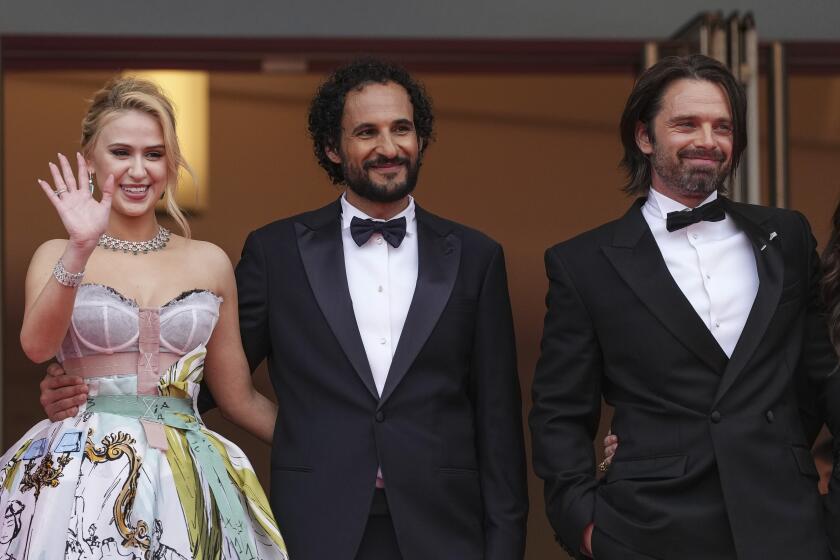Wide Range of Astaire, Gleason Films Available; X and R-Rated Versions of ‘Angel Heart’ Due
Fred Astaire and Jackie Gleason, who both died this week, are well represented on home video. Nearly all of Astaire’s films are available--most selling for $20-$30--and Gleason can be seen not only in a variety of movies but also in episodes of his classic “Honeymooners” series.
Our most prevalent image of Astaire is him in tails, dancing in some ‘30s movie. His most fertile period was 1935-37, when he was making fluffy musicals, mostly directed by Mark Sandrich and co-starring Ginger Rogers, that were temporary cures for the Depression blues. The music in these movies was as notable as the dancing.
RKO’s “Top Hat” (1935) is high-society hi-jinks, with Astaire chasing Rogers, who’s hesitant because of some mistaken-identity plot device. Forget the plot and focus on songs like “Cheek to Cheek” and “Top Hat, White Tie and Tails.” This is the definitive Astaire-Rogers movie.
Judging Astaire movies strictly on the quality of the music, RKO’s “Swing Time” (1936), co-starring Rogers, may be his best. It features “A Fine Romance,” “The Way You Look Tonight” and his endearing Bojangles song-and-dance number.
RKO’s “Shall We Dance” (1937), is chiefly remembered for its great George Gershwin score, including “Let’s Call the Whole Thing Off,” “They All Laughed” and “They Can’t Take That Away From Me.” The plot, about a faked marriage, is sillier than usual and gets in the way sometimes. Rogers co-stars again.
RKO’s “Follow the Fleet” (1936), about sailors falling in love, includes some of the best Astaire-Rogers production numbers and rhapsodic Irving Berlin songs such as “Let’s Face the Music and Dance” and “Let Yourself Go.”
“A Damsel in Distress” (1937), directed by George Stevens, features George Gershwin’s “A Foggy Day in London Town” and “Nice Work If You Can Get It.” George Burns and Gracie Allen are hilarious in supporting roles. The only negative is Joan Fontaine, who’s stiff as the love interest.
Another ‘30s films of interest is MGM/UA’s “Dancing Lady” (1933), a must for Astaire fans, mainly because it’s his first film. It’s a kick watching him dance with an ambitious hoofer played by clod-hopping Joan Crawford, who’s torn between two beaus (Clark Gable and Franchot Tone) while she shoots to stardom.
Nostalgia Merchant’s “Flying Down to Rio” (1933) is a disjointed mess--but an enjoyable one. It’s notable for some bizarre dance numbers and for Astaire’s dancing debut with Rogers--in the unforgettable “Carioca” number.
His musicals in the ‘40s and ‘50s weren’t such blatant escapist fare and, consequently, despite the excellent dancing, are not quite as much fun. MCA’s “Holiday Inn” (1942) was probably the best of his ‘40s movies.
The two gems he made with Cyd Charisse, “The Band Wagon” and “Silk Stockings”--both on MGM/UA--are arguably his finest ‘50s musicals.
It’s safe to say that any movie that features an Astaire dance number is worth a look. But when he wasn’t dancing--or at least singing--in a musical, he wasn’t really special. There’s no real need to watch dramas like “On the Beach” (1959), “The Towering Inferno” (1974) or the dreaded “The Amazing Dobermans” (1979) to see Astaire’s performances; there’s nothing there to savor.
GLEASON: Ironically, the comedian’s best screen performances are in dramas--CBS-Fox’s “The Hustler” (1961) and HBO’s “Nothing in Common,” currently No. 14 on the Billboard magazine rental chart.
For Gleason, the problem with “The Hustler” is that his portrayal of pool master Minnesota Fats, probably the best acting of his career, tends to get lost among all those other great performances--by Paul Newman, Piper Laurie and, most notably, George C. Scott. At the time, Gleason’s performance was a surprise. No one knew the comedian could handle drama so well.
In “Nothing in Common,” he plays a crotchety, has-been salesman whose illness forces a radical change in his superficial relationship with his playboy son (Tom Hanks). The father is the focal point of a dramatic storyline that’s woven into what is essentially a comedy. Though he didn’t get much recognition for it, Gleason’s performance was one of the best of last year.
Though he’s well-known for playing the bumbling, red-neck sheriff in the three-part “Smokey and the Bandit” series, these low-brow action comedies, available on MCA, aren’t Gleason at his best. He’s only slightly better in two minor light-comedies, RCA/Columbia’s “The Toy”(1982)--with Richard Pryor--and MCA’s “The Sting II” (1983). However, he does have some decent comic moments as a slick, blustery sergeant in the comedy/drama, “Soldier in the Rain” (1963)--co-starring Steve McQueen.
For Gleason in top comedy form, you have to turn to TV. His best known character is bus-driver Ralph Kramden in the “Honeymooners” series. MPI has released 17 volumes of the “lost” “Honeymooners” episodes, which aren’t part of the TV rerun package. Each volume, featuring two episodes, sells for $29.95.
COMING MOVIES: IVE will release two versions of the controversial drama “Angel Heart”--starring Mickey Rourke, Robert De Niro and Lisa Bonet--on Sept. 24. One, which showed in theaters, is R-rated, because 10 seconds of a steamy Rourke-Bonet love scene were cut out after the Motion Picture Assn. of America threatened to give it an X-rating. An uncensored version, including the excised footage, will also be available. Guess which version will be the big hit?
Next week’s releases: Lorimar’s “Crimes of the Heart,” starring Sissy Spacek, Jessica Lange and Diane Keaton, and Vista’s “Scene of the Crime” with Catherine Deneuve. The week of July 9: “The Golden Child,” “The Color Purple” and “That’s Life.”
NEW RELEASES: RCA/Columbia’s “No Mercy” wasn’t a box-office biggie, despite the sizzling combination of Richard Gere and Kim Bassinger. Yet between the females who flip over Gere and the men who fondly remember Bassinger as the sex toy in “9 1/2 Weeks,” it should be a big rental hit. The bounty in this one isn’t drugs or money or power--it’s a primal Bayou beauty (Bassinger). Because she indirectly causes the murder of a Chicago cop, she’s the object of a tug of war between a vicious New Orleans gang lord (Jeroen Krabbe) and the cop’s vengeful partner (Gere). Most critics thumbed their noses at it (too implausible, too predictable) but, viewed strictly as a sex-and-violence thriller, it delivers.
Media’s “Assassination,” disliked by critics and largely ignored by movie audiences, is based on an intriguing idea--the President’s wife as a target for a mystery killer who works for the White House. The hip, spunky First Lady (Jill Ireland) goes on the run with a steely secret agent (Charles Bronson). Their abrasive relationship, however, doesn’t generate any sparks. Though the dialogue is flat and the performances aren’t very good, the action scenes are terrific. This cassette is ideal for fans who are both gluttons for action and tolerant of indifferent performances.
OLD MOVIES: “Crossfire” (1947, Fox Hills, $19.95) is one of those unheralded ‘40s movies that’s usually overlooked when the best of the decade is assessed. But it deserves a spot among the ‘40s elite. Shot ominously in black and white, with plenty of shadow-infested scenes, it’s about the investigation of a murder that has anti-Semitic overtones. The investigating officer (Robert Young) has a prime suspect, a soldier whose buddy (Robert Mitchum) is out to prove his innocence. Another suspect is a sadistic soldier played to bone-chilling perfection by Robert Ryan. Only in the classic boxing movie “The Setup” (1949) is Ryan better. “Gentleman’s Agreement” (1945) dealt more thoroughly with anti-Semitism, but this movie is much more absorbing.
“David and Lisa” (1962, RCA/Columbia, $69.95), about two schizophrenic teen-agers, is a little dated. Originally made for a public that was fairly ignorant about psychology, it now seems psychologically naive. Set in an institution, it shows stern David (Keir Dullea) and fragile Lisa (Janet Margolin) inspiring each other to bloom. A movie about the bonding of two young psychotics with communication problems presents serious plot and dialogue obstacles that director Frank Perry and his wife, writer Eleanor Perry, surmount surprisingly well. Though it doesn’t seem as daring as it did in 1962, it’s still, in spots, touching and unsettling.
CHARTS
(Compiled by Billboard magazine)
TOP VIDEOCASSETTES, RENTALS 1--”The Color of Money” (Touchstone).
2--”Children of a Lesser God” (Touchstone).
3--”Heartbreak Ridge” (Warner Video).
4--”Ferris Bueller’s Day Off” (Paramount).
5--”Peggy Sue Got Married” (CBS-Fox).
TOP VIDOECASSETTES, SALES
1--”Top Gun” (Paramount).
2--”Jane Fonda’s Low Impact Aerobic Workout” (Lorimar).
3--”Callanetics” (MCA).
4--”Jane Fonda’s New Workout” (Lorimar).
5--”Here’s Mickey” (Disney).
More to Read
Only good movies
Get the Indie Focus newsletter, Mark Olsen's weekly guide to the world of cinema.
You may occasionally receive promotional content from the Los Angeles Times.






